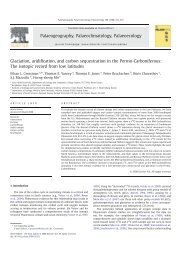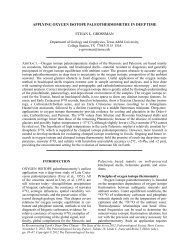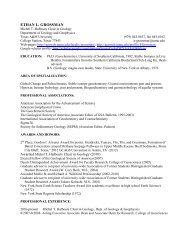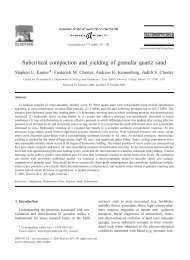Syllabus, Geol 410, Spring, 2013.
Syllabus, Geol 410, Spring, 2013.
Syllabus, Geol 410, Spring, 2013.
Create successful ePaper yourself
Turn your PDF publications into a flip-book with our unique Google optimized e-Paper software.
GEOL <strong>410</strong>: Hydrogeology<br />
<strong>Syllabus</strong>, <strong>Spring</strong> 2013<br />
Instructor:<br />
Dr. Hongbin Zhan, Professor and Holder of Endowed Ray C. Fish Professorship in <strong>Geol</strong>ogy,<br />
Halbouty Building 259 (office), phone: 979-862-7961 (office), 979-574-4819 (cell)<br />
email: zhan@geos.tamu.edu<br />
website: http://geoweb1.tamu.edu/Faculty/Zhan/course/<strong>410</strong>s13/<strong>410</strong>s13all.html<br />
Class Notes:<br />
Text:<br />
Class notes are the primary study materials and will be published in the instructor’s website.<br />
Fetter, C. W., Applied Hydrogeology, Merril Publishing Co., Columbus, OH, 592 pp., 4nd ed., 2001.<br />
Lecture Time and Location:<br />
MWF 9:10-10:00AM, Halbouty 104.<br />
Teaching Assistant:<br />
To be announced<br />
Office Hours:<br />
3:00-5:00 pm, Wednesday, in Halbouty Room 259 (my office).<br />
Course Grading:<br />
There are two exams (Midterm and Final, see the schedules below) and a series of assignments. The<br />
final exam is not comprehensive. It will only cover material since the midterm exam.<br />
• homework: 40% ;<br />
• midterm exam (March 8, Friday, 9:10-10:10a.m.): 30% ;<br />
• final exam (May 6, Monday, 8-10a.m.): 30% .<br />
Assignments can be accepted late occasionally within one week of the due day, but the grade will be<br />
reduced 25% for that assignment. Assignments CANNOT be accepted one week after the due day.<br />
Course Schedule and Outline:<br />
1. Introduction<br />
• Hydrologic cycle, water budget (1/16)<br />
• Base flow and base flow (1/18, 1/21)<br />
2. Physical Hydrogeology<br />
• Porosity (1/23, 1/25)<br />
• Darcy’s law and hydraulic conductivity (1/28, 1/30)<br />
• Isotropy and homogeneity (2/1)<br />
1
GEOL <strong>410</strong>: Hydrogeology<br />
• Aquifers, aquitards, and aquicludes (2/4)<br />
• Hydraulic properties of fractured rocks (2/6)<br />
• Karst aquifers (2/8)<br />
• Groundwater potential and hydraulic head (2/11, 2/13)<br />
• Interpretation of hydraulic head and groundwater conditions (2/15)<br />
3. Groundwater Flow Theory and Its Applications<br />
• Transmissivity and storativity of confined aquifers (2/25)<br />
• Release of water from confined aquifers (2/27)<br />
• Transmissivity and specific yield of unconfined aquifers (3/1)<br />
• Equations of groundwater flow (3/4)<br />
• Analytical solutions of one-dimensional groundwater flow problems (3/6)<br />
• Groundwater flow patterns (3/18)<br />
• Groundwater and geology (effective stress, groundwater flow and faulting) (3/20)<br />
• Measurement and interpretation of groundwater level data (3/22)<br />
4. Groundwater Resources and Environmental Management<br />
• Surface water-ground water interaction (3/25)<br />
• Land subsidence (3/27)<br />
• Sea water intrusion (4/1)<br />
• Flood control (4/3)<br />
• Groundwater and geotechnical engineering (4/5)<br />
5. Groundwater Flow to Wells and Hydraulic Testing<br />
• Field determination of hydraulic properties (4/8)<br />
• Steady-state flow to a well (the Thiem solution) (4/10, 4/12)<br />
• Methods of images: boundary effects (4/15)<br />
• Transient flow to a well: the Theis method (confined, unconfined, and<br />
semi-confined aquifers) (4/17, 4/19, 4/22)<br />
• Slug test (4/24)<br />
• Horizontal well hydraulics (4/26)<br />
6. Groundwater Quality and Contaminant Hydrogeology<br />
• Transport of contaminants in groundwater (non-reactive and reactive dissolved contaminants,<br />
non-aqueous phase liquids) (4/29)<br />
Midterm and Final Exam Schedules:<br />
Midterm: March 8 (Friday), <strong>2013.</strong> Class time+10 min extra (1 hour from 9:10-10:10a.m.).<br />
2
Final: 8-10a.m., May 6 (Monday), <strong>2013.</strong><br />
References:<br />
GEOL <strong>410</strong>: Hydrogeology<br />
Freeze, A. R. and Cherry, J. A., Groundwater, Prentice Hall, Englewood Cliffs, NJ, 1979.<br />
Hiscock, Kevin, Hydrogeology, Principles and Practice, Blackwell Publishing, Oxford, UK, 2005.<br />
All students should pay attention to the following:<br />
THE AMERICANS WITH DISABILITIES ACT (ADA): is a federal anti-discrimination statute that<br />
provides comprehensive civil rights protection for persons with disabilities. Among other things, this<br />
legislation requires that all students with disabilities be guaranteed a learning environment that provides<br />
for reasonable accommodation of their disabilities. If you believe you have a disability requiring an<br />
accommodation, please contact the Department of Student Life, Services for Students with Disabilities in<br />
Room B118 of Cain Hall. The phone number is 845-1637.<br />
AGGIE HONOR CODE: based on the long-standing affirmation that An Aggie does not lie, cheat, or<br />
steal or tolerate those who do, is fundamental to the value of the A&M experience. Know the<br />
Code. Aggie Code of Honor: "An Aggie does not lie, cheat, or steal or tolerate those who do.<br />
<br />
COPYRIGHT AND PLAGIARISM POLICY:<br />
All materials used in this class are copyrighted. These materials include but are not limited to syllabi,<br />
quizzes, exams, lab problems, in-class materials, review sheets, and additional problem sets. Because<br />
these materials are copyrighted, you do not have the right to copy the handouts, unless permission is<br />
expressly granted.<br />
As commonly defined, plagiarism consists of passing off as one's own the ideas, words, writings, etc.,<br />
which belong to another. In accordance with this definition, you are committing plagiarism if you copy<br />
the work of another person and turn it in as your own, even if you should have the permission of that<br />
person. Plagiarism is one of the worst academic sins, for the plagiarist destroys the trust among colleagues<br />
without which research cannot be safely communicated. (Please see http://library.tamu.edu/aggiehonor.)<br />
3








